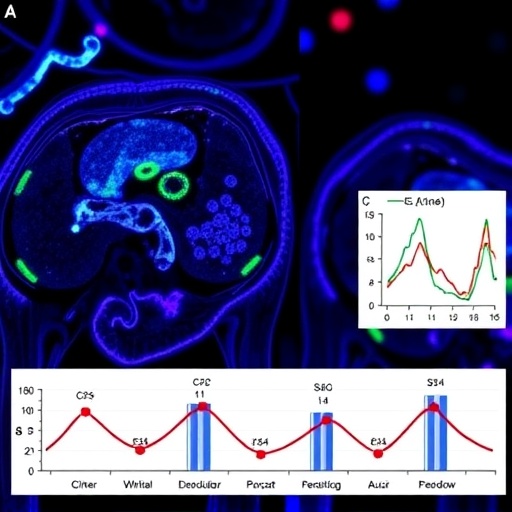Recent groundbreaking research has unveiled a crucial mechanism contributing to gemcitabine resistance in pancreatic cancer, a disease notorious for its poor prognosis and high mortality rate. The study carried out by Jeong et al. elucidates how the upregulation of CITED4 plays a pivotal role in the modulation of BIRC2 expression, which in turn influences the response of pancreatic cancer cells to gemcitabine treatment. Understanding this relationship not only sheds light on the molecular underpinnings of drug resistance but also opens new avenues for therapeutic interventions aimed at improving treatment outcomes for patients suffering from this aggressive cancer form.
Pancreatic cancer ranks as one of the deadliest malignancies due to its late diagnosis and limited treatment options. Gemcitabine, a standard chemotherapeutic agent, has been the backbone of treatment for this condition; however, its efficacy is often severely compromised by the development of drug resistance. The study investigates the interplay between CITED4, a transcriptional coactivator, and BIRC2, an inhibitor of apoptosis protein, emphasizing their roles in cancer cell survival and drug resistance mechanisms. Researchers have long sought to unravel these intricate pathways, and this study promises to enhance our current understanding of cancer biology significantly.
The research team focused on the signaling pathways involved in gemcitabine resistance, particularly highlighting how CITED4 is upregulated under treatment pressure. This transcriptional coactivator acts as a bridge, linking various signaling cascades that govern cell survival. The findings suggest that elevated levels of CITED4 not only promote the survival of pancreatic cancer cells but also facilitate the expression of BIRC2, which provides these cells with resistance to apoptotic signals induced by gemcitabine. Such insights are critical, as they suggest that targeting CITED4 may offer a novel strategy to overcome resistance in pancreatic cancer treatment.
In a series of meticulously designed experiments, the researchers employed a variety of cell lines and xenograft models to establish a connection between CITED4 expression and cancer cell resilience to gemcitabine. Through Western blotting, qRT-PCR, and functional assays, they demonstrated that silencing CITED4 led to increased sensitivity to gemcitabine, indicating its central role in mediating drug resistance. This correlation underscores the potential of CITED4 as a biomarker for predicting patient response to gemcitabine treatment, drawing attention to the need for further investigations into its clinical applicability.
Moreover, the study delves into the complex regulatory mechanisms governing BIRC2 expression. It was observed that CITED4 directly influenced the transcriptional landscape, enhancing BIRC2 levels and, consequently, enabling pancreatic cancer cells to evade drug-induced cell death. This finding emphasizes the significance of the CITED4-BIRC2 axis in the context of chemoresistance. Understanding these molecular interactions not only aids in delineating the resistance mechanisms but also offers target points for novel therapeutic interventions that could restore drug sensitivity.
As researchers continue to address the challenges posed by pancreatic cancer, this study contributes a crucial piece to the puzzle of gemcitabine resistance. The data presented by Jeong et al. support the notion that modulating CITED4 could represent a promising therapeutic strategy, particularly in conjunction with existing chemotherapy regimens. By disrupting the CITED4-BIRC2 axis, therapeutic approaches could potentially enhance the effectiveness of gemcitabine, thereby improving overall patient outcomes in a disease characterized by its relentless nature.
The implications of this research extend beyond basic science as it holds the promise of personalized medicine for pancreatic cancer patients. With ongoing advancements in molecular targeted therapies, the findings provide a framework for developing combination treatments that could effectively mitigate resistance mechanisms. By tailoring treatments based on individual tumor characteristics, clinicians may improve the prognostic landscape for those battling this devastating disease.
Additionally, the exploration of CITED4 as a therapeutic target raises important questions about the wider applicability of this approach across different cancer types. Many malignancies exhibit similar resistance mechanisms, and thus, insights gleaned from this study could inspire research into effective therapeutic strategies for other chemoresistant tumors. The universality of the CITED4-BIRC2 relationship may indeed transcend pancreatic cancer, potentially reshaping the therapeutic landscape for various cancers where drug resistance remains a formidable challenge.
Nonetheless, further research is warranted to fully elucidate the role of CITED4 in other signaling pathways and its interactions with various oncogenic factors. Future studies should aim to explore the dynamic nature of CITED4 expression in response to different chemotherapeutic agents and its impact on tumor microenvironment interactions. Such investigations could provide deeper insights into the multifaceted nature of drug resistance in pancreatic cancer and beyond, ultimately guiding the development of more effective therapeutic regimens.
In conclusion, the pivotal role of CITED4 in mediating gemcitabine resistance through the regulation of BIRC2 expression marks a significant advance in our understanding of pancreatic cancer biology. This study not only highlights critical molecular interactions that underpin therapeutic resistance but also presents powerful implications for future research and clinical applications. As the quest for effective pancreatic cancer therapies continues, targeting the CITED4-BIRC2 axis presents a compelling strategy that could reshape the treatment paradigm for this challenging malignancy. The continued exploration of these critical pathways will be crucial as we strive to improve outcomes for patients facing the grim realities of pancreatic cancer.
Subject of Research: Gemcitabine resistance in pancreatic cancer mediated by CITED4 upregulation through the regulation of BIRC2 expression.
Article Title: Gemcitabine resistance by CITED4 upregulation via the regulation of BIRC2 expression in pancreatic cancer.
Article References: Jeong, EJ., Roh, Y., Jung, E. et al. Gemcitabine resistance by CITED4 upregulation via the regulation of BIRC2 expression in pancreatic cancer. J Biomed Sci 32, 49 (2025). https://doi.org/10.1186/s12929-025-01140-y
Image Credits: AI Generated
DOI: 10.1186/s12929-025-01140-y
Keywords: CITED4, BIRC2, gemcitabine resistance, pancreatic cancer, therapeutic strategies, personalized medicine.




